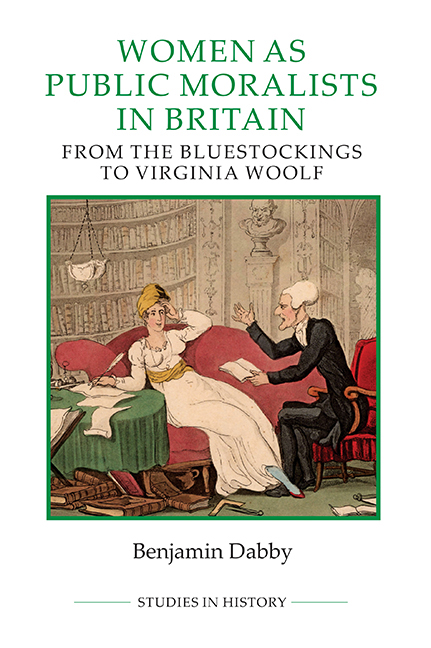The contexts of conclusions
Published online by Cambridge University Press: 25 October 2017
Summary
Nineteenth and early twentieth-century public moralism was a gendered practice in which women and men of letters shaped new understandings of masculinity and femininity at the same time as they attempted to improve the world around them. The extent to which they rejected or reworked gendered language and beliefs about human character may seem strange at the start of the twenty-first century when the latest research into human physiology provides more evidence that our behaviours, skills and values are not determined by our physical attributes but are intensely socialised from birth. The realisation that human potential is not determined by sex is what made it possible for the women moralists at the heart of this history to manipulate gendered stereotypes. The preeminent examples of Anna Jameson, Hannah Lawrance, Margaret Oliphant, Marian Evans, Eliza Lynn Linton, Beatrice Hastings, Rebecca West and Virginia Woolf show that a tradition of women moralists made an unprecedented and decisive contribution to public conversations about British culture and society in periodicals which spanned the range of the country's politics and geography.
There are two reasons why this history has not been written before. The first is that some have claimed that historiography itself almost always ‘derives from and in turn underpins an essentially “patriarchal” structure’. This claim has informed much of the ‘recovery and positive revaluing’ of women's history, but it has also led to the arbitrary claim that women of letters sought ‘to hide behind the convention of anonymity’ in the periodical press. The assumption that language itself posed a patriarchal barrier to the kind of public work undertaken by women writers has been corroborated, it is claimed, by extensive research into the gendered inequalities enshrined by British law and social custom, and the organised campaigns to repeal them culminating in the suffragist and suffragette movements at the turn of the twentieth century. This historical teleology is the second major reason why the history of women's contribution to British public moralism has been ignored, because it defines women's public engagement by a narrow definition of political activism, whether one looks to women's intervention into the prosecution of Queen Caroline in the 1820s, to the emergence in the 1850s of the Langham Place group's campaign to reform marriage law, or to debates on women's education and suffrage as the century wore on.
- Type
- Chapter
- Information
- Women as Public Moralists in BritainFrom the Bluestockings to Virginia Woolf, pp. 228 - 230Publisher: Boydell & BrewerPrint publication year: 2017



